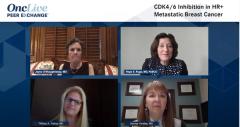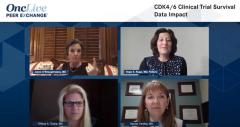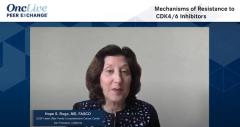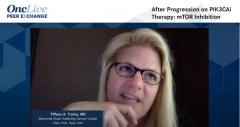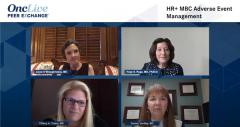
Phase 3 ASCENT Regimen Accelerated Approval
Episodes in this series

Joyce O’Shaughnessy, MD: We have got 1 more therapeutic option that is pretty new to our practice. I thought we might talk about sacituzumab: what we know from the available phase 2 data, what was said about ASCENT, the phase 3 trial, and a refresh for our memory about the data.
Then we want to finish up the discussion by how we incorporate sacituzumab; we've talked about checkpoint inhibitors, PARP inhibitors, now we'll talk about sacituzumab govitecan. How do we do the first line, second line, third line for our various emerging subtypes of triple negative? Hope, could you summarize for us what you’re thinking about sacituzumab?
Hope S. Rugo, MD, FASCO: I'm happy to. I think it's been very exciting for us to have another agent approved in the treatment of patients with resistant triple negative breast cancer [TNBC]. Of course, we're very interested to see how this antibody drug conjugate [ADC] fares in earlier-line therapies in different combinations, even in the neoadjuvant setting. Sacituzumab is in the ever-popular group of drugs now called antibody drug conjugates, and it's a fascinating antibody against Trop-2, which appears to be highly expressed in most subsets of breast cancer, if not all. It's linked to a novel toxin, and it's the metabolite of irinotecan SN-38. It has a high drug-to-antibody ratio similar to the current new class of antibody drug conjugates, where it's really double what we saw for T-DM1 [trastuzumab emtansine].
That may have an impact both on efficacy and toxicity, of course, but also on some bystander effect type of response that we may be seeing. Sacituzumab is dosed differently than some of the other ADCs; it's given day 1 and day 8 every 3 weeks, and it was initially tested in a phase 1b expansion, where there were a number of different tumors that were tested in different subtypes. In that initial expansion, there were exciting response rates seen in patients who had received 3 to 5 prior lines of chemotherapy.
That is hard because patients with very resistant triple negative disease don't get to 5 lines of therapy, unfortunately, due to poor responses and organ dysfunction. In these patients who were heavily pretreated, there did seem to be good and durable responses. This trial was expanded to include 108 patients, which was the number that was used for the FDA accelerated approval. This is a single-arm trial, and it's similar to what we just saw for trastuzumab deruxtecan; you can have a single-arm phase 2 study that meets an unmet need, like heavily pretreated patients who received most prior treatment.
If you have good efficacy data and reasonable toxicity, you get accelerated approval, but you have to show that it's better than a standard in a randomized phase 3 trial to get final approval. The overall response rate in those 108 patients who were heavily pretreated was 33%, and almost all were partial responses, but about 3% had complete responses. The median response duration was almost 8 months, going out to 11 months, which is certainly better than we see with anything else that we treat patients with in the third-line or greater setting.
The range actually went out for some patients who are on drug for more than 2 years, and we don't really know who those are, which was really amazing. There were about 17% of patients who stayed on treatment for more than 12 months, which was amazing. The drug itself is reasonably well tolerated. It's interesting, going into these studies we thought the biggest issue would be diarrhea, based on irinotecan. Diarrhea occurs, but it's pretty easily managed with education and using antidiarrheal medications as needed.
We haven't actually been testing for UGT1A1 polymorphisms that had been looked at in irinotecan because it really hasn't been associated with more diarrhea at the moment. I think it just has to do with the amount of exposure to free drug. You must educate patients, but it's usually pretty well managed. Neutropenia, however, is very common. About 65% of patients had at least some grade of neutropenia, and 43% had grade 3 to 4 neutropenia. Thrombocytopenia was rare; anemia is the usual problem we run into.
For the neutropenia, I think that what they did in the trials and in the ASCENT trial, is require an ANC [absolute neutrophil count] of 1.5 going into each new day 1 of a cycle. In clinical practice, we’re much less likely to use that. We use an ANC of 1. I think that we have to have a low threshold for using growth factors in patients, and in fact, my approach has been since the approval is that if a patient needed growth factors for gem/carbo [gemcitabine/carboplatin], or eribulin, they’re going to need growth factors for sacituzumab, so you might as well start out using something; you can always back off.
It works pretty well. Some people have even used pegfilgrastim after the day 8 because you have 2 weeks, although that certainly is by investigator decision. Then the final trial that will lead to approval is ASCENT. The ASCENT trial had a press release just before the approval that demonstrated that they reached their primary end point with a progression-free survival benefit comparing sacituzumab govitecan to chemotherapy of physician choice in the third line or greater. These are very exciting data. We look forward to seeing it sometime later this year, but it hasn't yet been presented. There just aren’t data yet.
The other thing to briefly mention is that alopecia is seen with many of these new antibody drug conjugates; 38% of patients had grade 1 or 2 alopecia. You do have to warn patients that they can lose their hair, and we don't yet know if scalp cooling works. Alopecia is also seen with the other ADC that recently had accelerated approval, trastuzumab deruxtecan. A lot of people can keep most of their hair, but you have to warn patients because it's a big issue in the metastatic setting.
Transcript edited for clarity.




